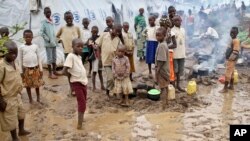The United Nations refugee agency reports thousands of Burundians are fleeing the country in the wake of a foiled coup attempt to oust the president, Pierre Nkurunziza. The UNHCR says refugee numbers in Tanzania, Rwanda, and the Democratic Republic of Congo have soared to more than 105,000 since violence erupted in mid-April.
The U.N. refugee agency reports a sharp rise in the number of refugees in Tanzania in the last few days. Local immigration authorities say more than 50,000 Burundians are living rough in Kagunga on the shore of Lake Tanganyika. At least 10,000 people reportedly are waiting to cross the border into Tanzania.
In addition, the UNHCR says 26,300 Burundians have taken refuge in Rwanda and more than 9,000 in the province of South Kivu in the Democratic Republic of Congo. UNHCR spokeswoman Karin de Gruijl tells VOA there probably are fewer refugees in these countries than in Tanzania because people are being blocked from leaving Burundi.
“It is easier to block the road to Rwanda and to the road to DRC than preventing people moving up to Tanzania. Again, there have been roadblocks. People have been talking about being harassed by militias; some of them by bribes, some clearly with a political agenda of trying to stop people from fleeing the country," said de Gruijl.
De Gruijl says the sudden influx of huge numbers of refugees in Tanzania is putting a strain on the ability of the government and aid agencies to respond. She says the living conditions of people arriving in Kagunga are extremely dire. She adds that people have managed to bring some food and can fish in the lake, but lack clean drinking water, latrines and shelter.
Concern over armed forces
Meanwhile, the Office of the High Commissioner for Human Rights says it is concerned actions taken by armed forces in Burundi over the past two days may endanger the lives of civilians.
The High Commissioner’s spokesman, Rupert Colville, warns the instability in the country may be prolonged or made even worse if there are reprisals in response to the failed coup.
“We have heard reports of numerous attacks on both private and state media with radio and television stations destroyed. This obviously endangered the lives of the journalists who were still inside those buildings. We call for a re-opening as soon as possible of all media outlets and the respect of the independence of journalists. There is also an urgent need to ensure the safety of human rights defenders in Burundi. To give just one example, one of Burundi’s most prominent human rights defenders, Pierre-Claver Mbonimpa…has had to go into hiding after receiving death threats," said Colville.
Deadly protests erupted in Burundi in mid-April after President Nkurunziza declared his intention to seek a third term. More than a dozen people have been killed and many injured.
The president has resisted all pressure from the international community to postpone the election, which is scheduled for June 26, saying it would only make matters worse. He was in Tanzania attending an emergency meeting with East African leaders when the coup attempt occurred.
Burundi emerged from 10 years of civil war in 2005, in which the ethnic Hutu and Tutsi communities fought each other for power. U.N. officials say the current crisis is political, but worry it could become an ethnic battle if it is not resolved soon. They warn political instability and reports of intimidation of civilians could result in a major humanitarian crisis.




